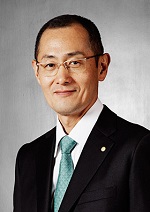Japan's deep research bet on regenerative medicines from induced pluripotent stem cells (iPS) is set to move from the lab to patients soon for some of the most vexing medical ailments, a noted expert in the field told Nikkei Asian Review.

Professor Shinya Yamanaka
Nobel laureate Professor Shinya Yamanaka, the head of Kyoto University's Center for iPS Cell Research and Application, or CiRA, told Nikkei that a "second stage" of iPS work will be available and produce therapies to treat Parkinson's disease and blood and cartilage ailments in the near future.
In August of last year, CiRA said it hoped to ramp up clinical tests starting in 2016 by building up an iPS cell stockpile that could significantly cut the cost of regenerative treatments that often run to hundreds of millions of yen.
Other applications could see therapies to treat impaired cranial nerves that cannot fully recover with ordinary surgery.
In April, CiRA and Takeda Pharmaceutical announced a decade-long R&D effort to discover new applications for iPS cells in areas such as heart failure, diabetes mellitus, neurological disorders and cancer immunotherapy.
The program is led by Yamanaka, while Takeda provides long-term funding and related logistics.
"I want to pursue new life-science research using iPS cells," Yamanaka told Nikkei on the sidelines of a conference marking the 10-year anniversary of the work that won him the Nobel Prize in physiology or medicine for the discovery that mature cells can be reprogrammed to become pluripotent.
One aim is to use "next-generation techniques" that will turn cancer cells back into normal cells, he told Nikkei, adding that "I also want to do research looking into infectious diseases like the Zika virus."
Japan has also created a fast-track effort to get cutting-edge academic research into the drug approval pathway faster.
In February, authorities said a review of 5 candidates for the program known as Sakigake includes three regenerative medicine candidates that count among them a gene therapy backed by Tokyo-based Daiichi Sankyo and developed at the University of Tokyo's Institute of Medical Science dubbed G47Δ to treat brain tumors that is in Phase II trials.
- here's the article from Nikkei Asian Review